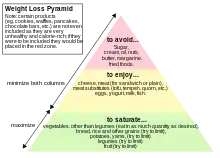A calorie is a calorie
"A calorie is a calorie" is a tautology used to convey the speaker's conviction that the concept of the "calorie" is in fact a sufficient way to describe energy content of food.
The tautological phrase means that regardless of the form of food calorie a person consumes (whether a carbohydrate, protein or fat calorie) the energetic value of such a calorie, is identical to any other. One dietary (or food) calorie[lower-alpha 1] is equivalent to 4,184 joules by definition. With this knowledge, it is easy to assume that all calories have equal value.[1]
However, good human nutrition measures foods for other values than just energy in calories.

History
In 1878, German nutritionist Max Rubner crafted what he called the "isodynamic law".[2] The law claims that the basis of nutrition is the exchange of energy,[3] and was applied to the study of obesity in the early 1900s by Carl von Noorden. Von Noorden had two theories about what caused people to develop obesity. The first simply avowed Rubner's notion that "a calorie is a calorie". The second theorized that obesity development depends on how the body partitions calories for either use or storage.[2] Since 1925, the calorie has been defined in terms of the joule; the current definition of the calorie was formally adopted in 1948.[4]
The related concept of "calorie in, calorie out" is contested[5] and despite having become a commonly held and frequently referenced belief in nutritionism, the implications associated with "a calorie is a calorie" are still being debated.[6][7][8] The wisdom and effects of skipping meals in an attempt to limit caloric intake is also still largely debated.[9][10][11]
Calorie counting
Calorie amounts found on food labels are based on the Atwater system.[12] The accuracy of the system is disputed, despite no real proposed alternatives. For example, a 2012 study by a USDA scientist concluded that the measured energy content of a sample of almonds was 32% lower than the estimated Atwater value.[13] Furthermore, it is known that some calories are lost in waste, without ever having been chemically converted or stored. The driving mechanism behind caloric intake is absorption, which occurs largely in the small intestine and distributes nutrients to the circulatory and lymphatic capillaries by means of osmosis, diffusion and active transport. Fat, in particular is emulsified by bile produced by the liver and stored in the gallbladder where it is released to the small intestine via the bile duct. A relatively lesser amount of absorption, composed primarily of water, occurs in the large intestine.
Facts
One dietary Calorie contains 4184 joules of energy. The human body is a highly complex biochemical system that undergoes processes which regulate energy balance. The metabolic pathways for protein are less efficient than the metabolic pathways for carbohydrates and fat. Protein contains four calories per gram, although a large part of the calories are lost as heat when metabolised by the body.[1]
See also
Footnotes
- Equivalently kilocalorie (denoted with the unit symbol "kcal" or "Cal"), and more rarely referred to as the kilogram calorie or large calorie, to avoid confusion with the "small" (or "gram") calorie of 4.184 J.
References
- "A calorie is NOT a calorie". Authority Nutrition. 2016. Archived from the original on 2017-05-23.
- Taubes, Gary (30 June 2012). "What Really Makes Us Fat". The New York Times. Retrieved 25 April 2013.
- The Biochmeical Journal, Volume 16. Biochemical Society. 1922. p. 751.
- Andrews, A. (2015). "Calorie". Black's Veterinary Dictionary.
- Taubes, Gary (24 September 2007). "The Scientist and the Stairmaster". New York Magazine. Retrieved 8 May 2013.
- Sass, Cynthia (7 February 2013). "Why Calorie Counts are Wrong: 6 Diet Myths, Busted". health.com. Retrieved 25 April 2013.
- Gann, Carrie. "For Calories, It's All About Quality Over Quantity, Harvard Study Says". ABC News. Retrieved 25 April 2013.
- Nesheim, Malden. "Is a Calorie a Calorie?". NOVA. PBS. Retrieved 25 April 2013.
- Zeratsky, Katherine. "Breakfast: How does it help weight control?". Mayo Clinic. Retrieved 28 April 2013.
- "Breakfast is 'most important meal'". BBC News. 7 March 2003. Retrieved 28 April 2013.
- Reinagel, Monica. "Is Skipping Breakfast Bad For You?". Nutrition Diva. Retrieved 28 April 2013.
- Maynard, Leonard (1944). "The Atwater system of calculating the caloric value of diets". 440 - 443.
- Nesheim, Nestle, Malden, Marion (2012-09-20). "Is a Calorie a Calorie?". PBS NOVA. Retrieved 2013-05-08.